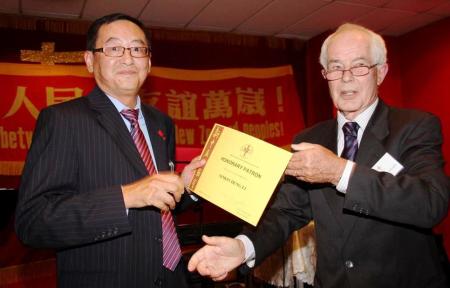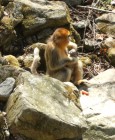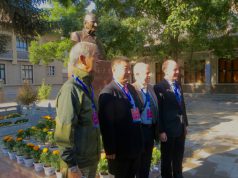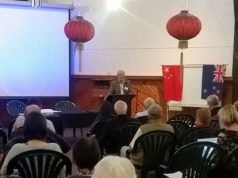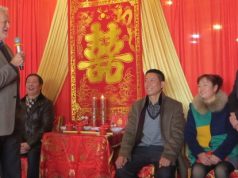
Honorary Patron of our Society Simon Deng Li
At the Wellington Branch New Year banquet Simon Deng Li (left) was presented with a certificate by President Eric Livingstone, to mark his appointment as Honorary Patron of our Society.
NZCFS National Conference 2013
Christchurch, 24 – 26 May 2013
Lecture Theatre C1, University of Canterbury
“Chinese Culture”
Well, planning is well under way for what is going to be a wonderful and exciting conference!
With a theme of Chinese Culture, we will be covering everything from an exhibition of photos from a recent China tour by keen amateur photographers, to calligraphy, block prints, poetry, dancing, singing, various Chinese arts and crafts and great speakers, plus the New Zealand debut of an Art Exhibition by artists who are members of the Beijing Research Institute of Culture and History, who will be exhibiting thirty original paintings especially for this conference. For more information go to: https://nzchinasociety.org.nz/12630/nzcfs-national-conference-2013
Four Rewi Alley Friendship and Exchange Fund Projects
The first NZCFS Youth Internship has been awarded.
The Society has established an “NZCFS Youth Internship”, open to young New Zealanders to engage in activity in China to provide closer co-operation between the two countries.
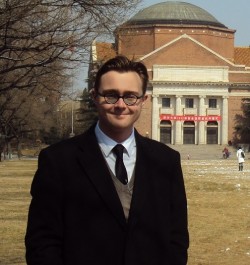
2013 is the first year the internship has been offered, and it has been awarded to Charles John Rowe (BA, BSc, Dip Lang), a 24 year-old graduate of the University of Otago. His project is titled “The Case of Maori Business Projects and Shanghai Pengxin: a potential turn around for New Zealanders’ perceptions of Chinese investment and Iwi-based land ownership.” He will interview an extensive range of people in Beijing, Shanghai and New Zealand, and produce a document that contributes to the public debate of Chinese investment in New Zealand.
From the good response shown in this round, we can see that there is strong interest from young people for this kind of financial support, and this is one good way of drawing their attention to NZCFS.
Training Young People in Cooperatives at Shandan Bailie School Cooperative Training Centre
The second RAFE project will provide practical training in relevant skills and knowledge for 20 young people from rural cooperatives in Gansu, enabling them to contribute to the development of their cooperatives and communities. The training will be provided over one year, with 4 sessions each lasting 5 days. Training will include knowledge of cooperative principles and management and business and technical skills aimed at improving production and marketing. Training will be provided by the Shandan Bailie School Cooperative Training Centre.
The young people will bring real-life problems faced by their cooperatives to training sessions and return to their cooperatives to apply in practice the skills and knowledge learned, thus continuing Rewi Alley’s legacy of combining education with practical problem-solving.
Publication of Rewi Alley Papers
Dov Bing, Professor in the Department of Political Science & Public Policy, Faculty of Arts and Social Sciences, University of Waikato, has papers written on Rewi Alley in 1973 by Professor James Bertram, H. Courtney Archer, Lewish Smythe, Ida Pruit, Professor Ralph Lapwood, Helen Foster Snow, Professor Brian Harland, Barbara Spencer, Professor Joseph Needham and himself. The papers are being typed ready for publication.
Rewi Alley Fellow
Ms Huo Yan, aged 23, has been selected as the first Rewi Alley Fellow, and arrives at the Michael King Writers’ Centre in Auckland for nine weeks at the end of April.
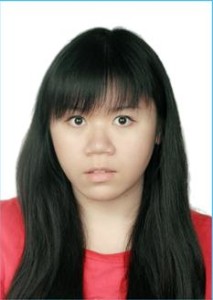
The Fellowship is a partnership between the NZ China Friendship Society and the Michael King Writers’ Centre. The association with Rewi Alley is particularly appropriate because of his historical and literary significance both to China and New Zealand.
Huo Yan says: I hope to benefit from the quiet and creative environment provided by the Michael King Centre to finish my novel “The Library”. This is set in a Beijing district library
where the seemingly enclosed space reflects the urbanization of China and explores the unmentionable psychological illness of city people. I wish to expand the vision of young writers, and exhibit the lives of all classes/levels of people in Beijing. This novel is also a key project for the Chinese Writers’ Association.
At the same time I wish to understand the lives of Chinese in Auckland, especially the younger generation, looking at differences for Chinese living in other countries, and write a short to medium length novel based on this. My particular concern is the issue of globalization of Chinese youth, and whether living in a foreign country they can maintain characteristics of their eastern culture or do they become entirely westernized .
I wish also to experience New Zealand especially Maori culture and this opportunity is especially precious for a writer who lives in a heavily polluted city.
I hope to meet local Chinese writers, as those living outside China have gained little recognition from China’s mainstream literature world. I wish to investigate the Chinese creative circle in New Zealand and introduce outstanding pieces.
Hon. Warren Freer, 27 December 1920 – 29 March 2013
Former Prime Minister Helen Clark has paid tribute to Warren Freer, who died last week, aged 92, for his pioneering work in contact with China. “When you look back at the 50s and Warren’s determination to open a window on China for New Zealand, this was pioneering and quite brave work and led to him being smeared quite a lot all his life as being pro-communist. He could see the potential of China a long time before anybody else did.”
Warren Freer represented the Mount Albert electorate from 1947 to 1981, when he retired. He was only 26 when he entered Parliament in a by-election and he held the seat for 34 years. In 1955 he was the first Western politician to visit China and recently he gifted Auckland branch of NZCFS his personal journals of his visits in 1955 and 1957.
The announcement by Norman Kirk in 1972 that Labour on being elected would recognize China, was quite ahead of its time, she said. Invited by Duncan France, Hibiscus Coast President, Warren attended the 2012 NZCFS Conference and was proud of the fact that he had seconded the Cabinet decision and Norman Kirk as Prime Minister had moved it.
Mr Freer was elected to Mr Kirk’s cabinet as Minister of Trade and Industry and Energy. “He was always considered a radical thinker,” Helen Clark said. “Warren could always be relied on to have a progressive position on things. That was his background.”
NZCFS Projects, Nature, Culture, History China Tour
October 2013
NZCFS is in the planning stage for an exciting new tour to China, in the popular “Projects” series. It includes a visit to a NZCFS project, where we meet our project partners and rural communities, with a comprehensive itinerary to sites through a diverse cultural and geographic environment. Travel from Yan’an, Shaanxi, in the north to Guilin, Guangxi, in the south. For an early look at the highlights, with themes of Nature, Culture and History, visit https://nzchinasociety.org.nz/news/tours-to-china
China Opening Up To The World by Philip Andrews
Invited to join the 2012 NZCFS Prominent Persons delegation to China, I had the opportunity to sample something of the culture of that huge and burgeoning country, New Zealand’s largest trading partner.
Apart from the cost of my flight to China, everything was paid for. A flight from Shanghai took us to Changchun, in Jilin province, a north-eastern province with rich soil in which corn flourishes. Its supplies of ginseng, antlers and forest frog oil provide for the needs of Chinese medicine. Wollastonite, iron and scoria are mined and quarried. The area manufactures fast trains, many automobiles (2.5 million last year), laser equipment and genetically engineered human insulin. There is a petrochemical industry producing crude oil and natural gas. Skiing and other snow activities are available, as are hot springs for bathing and supplies of fresh water from the hills. Conservation of natural features is practised and there was much talk of a green image, rather at odds with the smog and face masks seen in Changchun city, and the plethora of massive hoardings on the city’s approaches. Dust blown in from the northern desert does not help.
The theme of the Friendship Forum was “Understanding, Sharing and Win-Win” and was followed by a Sister Cities Conference in Chengdu, south-western China, with attendees from all over the world. A Fijian delegate, managing director of a hotel group, talked of sustainability and growth in their tourist industry. He told me that since New Zealand and Australia had “turned their back on Fiji”, it had turned to China, which was reaping the benefits of contracts. As for China itself, its offers of economic assistance are helping it gain a strategic foothold in the Pacific. In addition, as the China Daily recently pointed out, it is utilising Sister Cities as a means of developing its own inland cities, where formerly the coastal cities had been prominent. Chengdu in the province of Sichuan, has 18 sister cities and connections with another 36 cities, chosen for benefits such as increased tourism.
The motives of Sister City delegates are various: some have a genuine interest in the culture; some are connected through social welfare purposes like the group from Mosman in Sydney that assists Chinese girls from poor families to obtain a good education, or the Manitoba University programme for medical research and student exchange. Some are keen on establishing amenable political relationships. But an overriding motivation seems to be on both sides the pursuit of commercial opportunities. In broad terms, then, the Sister Cities Conference was designed to attract investment, assistance and cooperation, and might easily be dismissed as a big sell for business. But the Friendship Forum works at another, and more personal level, generating a more intimate bonding, a sharing of cultures, of food, of toasts, of ideas, of conversation, in this case set against a background of Chinese instruments.
At Chengdu we were treated to a trip to a 1200 year-old 71m statue of Buddha carved into a riverside sandstone cliff; a walk past the macaque monkeys up the 965 steps of the fog-shrouded 3000m high Enei Mountain; a visit to the Panda Breeding Centre; and an evening at the Sichuan Opera, not opera at all but a kaleidoscope of colour, a medley of sound and a mass of action, with jugglers and tumblers and aerial acrobats and muscular gymnasts, shadow silhouettes and a traditional comedy about a “soft ear” (henpecked spouse).
My wife and I made a private trip to the Jinsha Sites Museum, set among lawns and gardens and saw a 3000 year-old archaeological site. Among the more than 6000 artefacts found were elephant tusks and teeth, clam shells, jade and gold artefacts. Another treat was the Museum of Science and Technology, comprising four floors of displays. Among them were a dinosaur skeleton, three small line-dancing robots, and a section on the Chinese space programme.
To visit China and not see the Great Wall was a disappointment, but the whirlwind ten day sponsored visit introduced us to a thriving culture, and to a lovely group of attentive, cheerful, English-speaking young Chinese volunteer guides.


